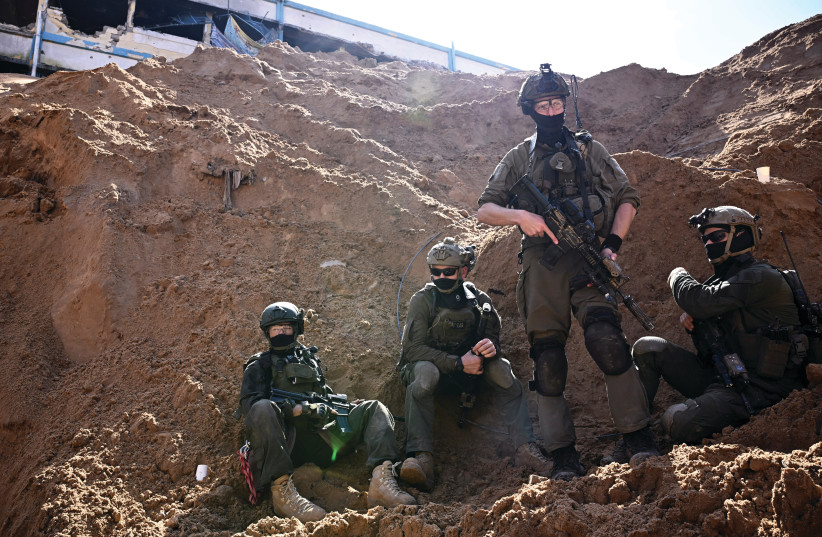Hamas continues to dictate the next stage of the Gaza war, both in its own view and in how it holds the world hostage by not agreeing to a hostage deal.
After Hamas violated the first hostage deal in December, it gambled that Israel would not keep up the military pressure on its terrorists in Gaza. Hamas now believes it has been proven correct; it believes it can basically outlast Israel in Gaza.
On April 30, Hamas and Palestinian Islamic Jihad were both quoted in the pro-Iran al-Mayadeen media describing their continued attacks on Israel in Gaza. For instance, terrorists fired rockets at Sderot at the end of Passover, just before sunset on April 29. In addition, rockets were fired toward Ashdod, landing in the sea.
The goal of Hamas and other Iranian-backed groups in Gaza is to keep up the pressure on Israel. This is carried out through rocket attacks that, although greatly reduced since the volleys of thousands in October, continue to pose a threat.
The terror groups also understand that firing one rocket at Sderot is basically the same as firing a dozen, if the goal is to get people in the city to have to seek shelter due to sirens.
The goal is to continue to harass the Israeli border communities to remind them that Hamas is still active. The genocidal terrorist group knows that this kind of low-level rocket fire and other threats to the border communities make life there unsettling. For instance, it is clear that Hamas and other terror groups purposely escalate over Jewish holidays and on Shabbat with rocket fire and other threats.
Hamas is proud of the fact that after almost seven months of war, it continues to have rocket-firing capabilities and can continue to carry out attacks across the Gaza Strip. Hamas has returned to much of Gaza because IDF forces left areas where they had been operating, enabling the terrorist group to return. While terrorist infrastructure such as tunnels were removed, Hamas gunmen continue to operate.
Gaza attacks on IDF corridor

For instance, a new report at Al-Mayadeen said Hamas has claimed several attacks in central Gaza. Hamas and other groups are seeking to attack IDF soldiers in the Netzerim corridor, a route the military established across Gaza that links the coast to Israeli communities near Be’eri and Nahal Oz. This enables the IDF to operate freely in central Gaza. The corridor is also supposed to facilitate aid entering Gaza from another maritime one.
The terrorists have other ideas, however. They want to target both corridors. The recent report says terrorists targeted Mughraqa, an area north of Nuseirat camp. The terrorists of PIJ also operate in Maghazai camp, where they claimed to down a quadcopter drone. In addition Hamas claims it targeted the Netzerim corridor with mortar shells.
OVERALL, the picture is clear. The Palestinian terror groups want to create the conditions for a low-level, low-intensity insurgency in Gaza. The Hamas battalions have been dispersed and gone to ground. Israel has claimed it defeated around 18 of the Hamas battalions and only six remain: two of them in central Gaza and four in Rafah.
But this is pre-October 6 thinking because Hamas has changed its tactics. It is also likely replacing its terrorists that were lost in the fighting over almost seven months. This means that even if Hamas lost up to 20,000 of its terrorists, either being killed or wounded, it can replace some of them.
The group is illustrating its staying power. It has already gone through several rounds or rebuilding its networks, as it did in Shifa Hospital between January and March, when up to 1,000 of its terrorists were found there. It has also sought to return to Shati, Zaytoun, Beit Hanoun, Beit Lahia and other areas in northern Gaza.
Now the IDF has replaced the Nahal Brigade that was in Netzerim with the 99th division, which includes the multi-dimensional unit that fought in Jabalya and central Gaza in the early part of the war. Hamas likely knows it is up against two recently deployed brigades that are now holding the corridor. These include the 2nd Carmeli Infantry Brigade and the 679th Yiftah Reserve Armored Brigade. The IDF announced the deaths of two soldiers on April 29.
Hamas is shifting focus to targeting the corridor and appears to be wondering about the IDF’s next moves in Gaza. The terrorist group knows that the army has postponed a Rafah offensive since March due to international pressure. It hopes to keep its pressure on Israel up and to keep drawing out the hostage talks, forcing Washington, Jerusalem and others to keep waiting.
Hamas also recently released two videos of US-Israeli hostages it is holding. One showed Omri Miran and Keith Samuel Siegel, who is a US citizen. It also recently released a video of Israeli-American hostage Hersh Goldberg-Polin. This is designed to pressure the US and to get the US to pressure Israel.
